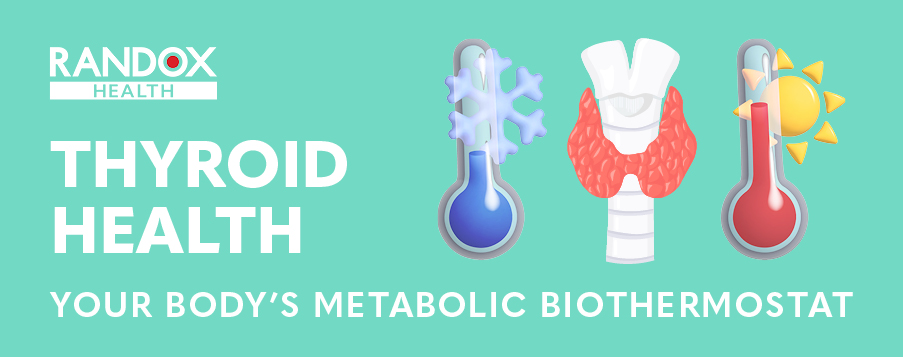02/08/2024
Welcome to Randox Health, your trusted source for reliable and accurate health information. This blog delves into the symptoms of thyroid problems, including hypothyroidism (underactive thyroid) and hyperthyroidism (overactive thyroid), which are prevalent conditions affecting millions globally.
What is the Thyroid Gland?
The thyroid gland is a small, butterfly-shaped organ located at the front of the neck. Despite its modest size, it plays a crucial role in regulating various bodily functions. The primary function of the thyroid gland is to produce hormones that manage metabolism, growth, and development. The thyroid is essential for maintaining energy levels, body temperature, and overall metabolic rate.
Understanding Thyroid Problems, Including Hypothyroidism and Hyperthyroidism
Thyroid problems primarily manifest as either hypothyroidism or hyperthyroidism.
Hypothyroidism (underactive thyroid) occurs when the thyroid gland does not produce sufficient thyroid hormones. This can lead to slow metabolism, fatigue, weight gain, dry skin, and sensitivity to cold temperatures. Other hypothyroidism symptoms may include hair loss, muscle weakness, and depression.
Conversely, hyperthyroidism (overactive thyroid) is characterised by the thyroid gland producing an excess of thyroid hormones. This can cause a fast metabolism, weight loss, increased appetite, anxiety, irritability, and difficulty sleeping. Additional thyroid disease symptoms may include rapid heartbeat, trembling hands, and excessive sweating.
At Randox Health, we offer comprehensive thyroid health testing to assess your thyroid function and help identify potential issues.
Causes and Risk Factors
Thyroid problems can occur due to various causes and are influenced by several risk factors. Understanding these can help in identifying and managing thyroid issues effectively.
Common causes of thyroid problems include:
- Autoimmune diseases: Conditions such as Hashimoto’s thyroiditis and Graves’ disease, where the immune system mistakenly attacks the thyroid gland.
- Iodine deficiency: Insufficient iodine intake can lead to an underactive thyroid (hypothyroidism).
- Thyroiditis: Inflammation of the thyroid gland, which can be caused by infections, autoimmune diseases, or medications.
- Thyroid nodules: Abnormal growths or lumps in the thyroid gland, which can be benign or cancerous.
Risk factors that can increase the likelihood of developing thyroid issues include:
- Gender: Women are more prone to thyroid problems compared to men, especially during pregnancy and menopause.
- Age: Individuals over the age of 60 are at a higher risk of developing thyroid disorders.
- Family history: Having a family history of thyroid problems increases the likelihood of developing similar issues.
- Previous thyroid surgery or radiation therapy: Past treatments involving the thyroid gland can impact its functionality.
Diagnosis and Tests
When it comes to diagnosing thyroid problems, several methods can be employed. These tests help determine the underlying cause of the symptoms and guide appropriate treatment.
A blood test is commonly used to help diagnose a thyroid issue. A thyroid blood test measures the levels of several thyroid hormones, including TSH (thyroid-stimulating hormone), T3 (triiodothyronine), and T4 (thyroxine). Abnormal levels of these hormones can indicate an overactive or underactive thyroid.
Early diagnosis and treatment of thyroid problems is essential for maintaining good health. If left untreated, thyroid conditions can lead to more serious complications, including heart problems, infertility, and mental health issues.
At Randox Health, we understand the importance of thyroid health. Our comprehensive health checks can assess your thyroid function, providing valuable insights into your overall well-being.



